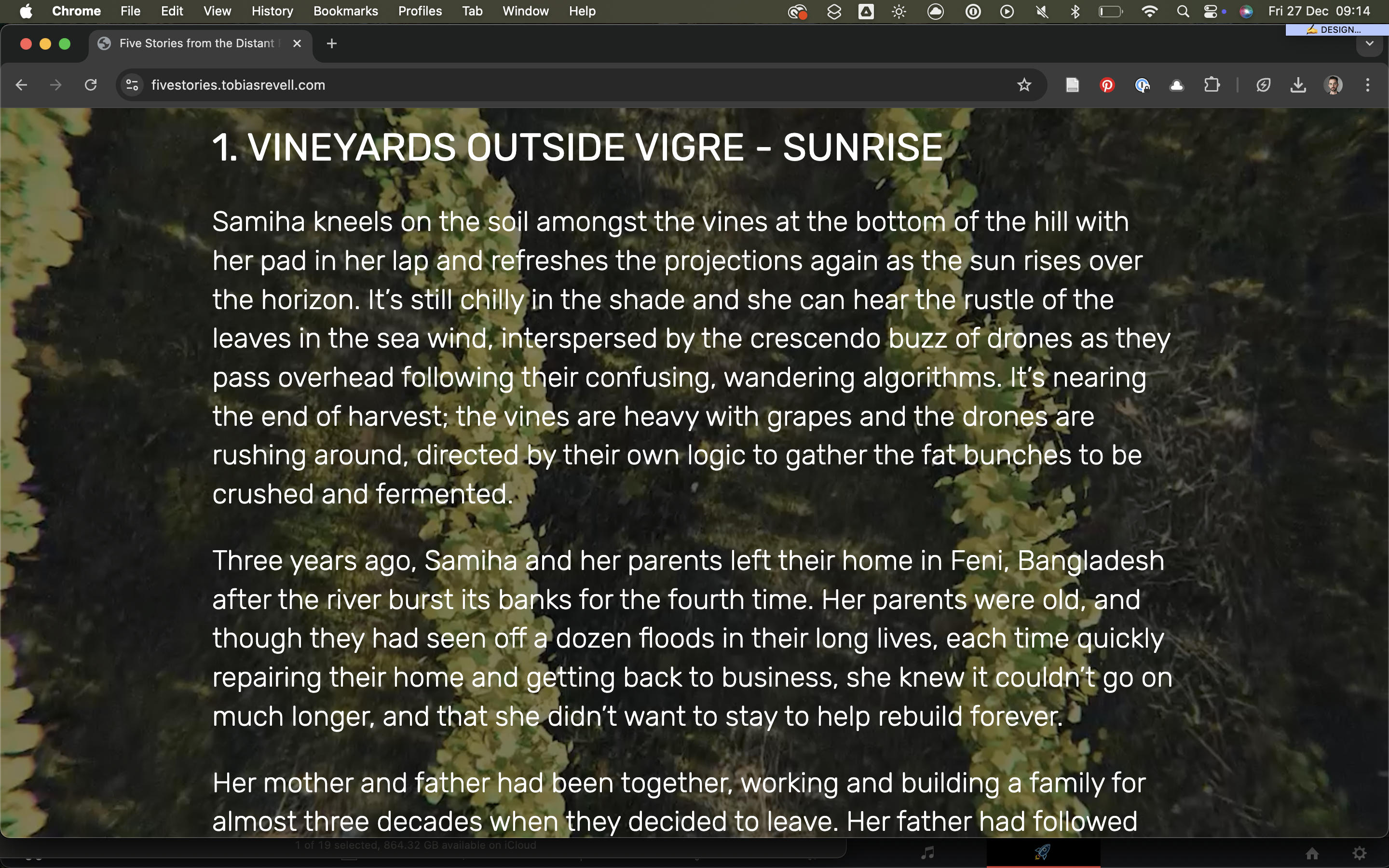


Five Stories from The Distant Future — Whenever Wherever – 2024-12
Reimagining Work: Five Stories from The Distant Future was originally written, created and produced for Whenever Wherever Festival at Orgatec 2024 and delivered as a performance lecture. The longer versions of the stories are presented at fivestories.tobiasrevell.com with their accompanying animations.
The world has changed unimaginably in the last thirty years, yet imagining the world thirty years from now is an increasingly difficult task, foreclosed by arguments over return-to-the office, hybrid work and the speculative impact of generative AI. What if we ask bigger questions: What does a future look like when growth is a nostalgic memory? Who profits when financial trade is a kooky niche subculture? What will we actually do all day if we’re automated out of work? What happens to our stuff if we slow down enough to let the world heal? What does a job look like in a world that’s turned consumers into carers?
In a (not so) distant future, we follow the lives of five characters as they go about their day. Their hopes, fears and aspirations are very much like ours, but they are set against a world of radical new network forms, a world conceptualised as a holistic, regenerative system, a world reordered by climate, social and technological shifts.
...
Samiha kneels on the soil amongst the vines at the bottom of the hill with her pad in her lap and refreshes the projections again as the sun rises over the horizon. It’s still chilly in the shade and she can hear the rustle of the leaves in the sea wind, interspersed by the crescendo buzz of drones as they pass overhead following their confusing, wandering algorithms. It’s nearing the end of harvest; the vines are heavy with grapes and the drones are rushing around, directed by their own logic to gather the fat bunches to be crushed and fermented.
Three years ago, Samiha and her parents left their home in Feni, Bangladesh after the river burst its banks for the fourth time. Her parents were old, and though they had seen off a dozen floods in their long lives, each time quickly repairing their home and getting back to business, she knew it couldn’t go on much longer, and that she didn’t want to stay to help rebuild forever.
Her mother and father had been together, working and building a family for almost three decades when they decided to leave. Her father had followed his father into shipbreaking, directing the disassembly and recycling of the massive hulks of steel that beached themselves on the shores south of Feni. Over that time, he had grown his small company of three school friends to a member-owned cooperative of almost 2000 employees including Samiha’s mother who he had found tinkering in a market electronics stall and now ran copper and rare-earth reclamation for the co-op.
Later came Samiha (and her two younger brothers, long since left home to Korea and France). Samiha was smart but grounded. She was the first in the family to go to university on one of the international digital campuses and she majored in regenerative design; hoping it would lead her to work on the new cities planned for Bangladesh. But after the flood, Samiha was convinced that the grab-bag of skills her family had accumulated over the decades could be translated and so, with some cajoling, she convinced her parents it was time to go and signed them up with UNHCR Displacement Taskforce Skills Exchange.
Three years later, Samiha sits on the soil of their vineyard on the outskirts of Vigre halfway along the coast road from Egersund to Stavanger with the fingertips of her right hand in the soil, her left hand scrolling on her pad. With her thumb, she cycles through different meteorological projections for their impact on her soil restoration programme.
The family had found themselves on the southwest Norwegian coast thanks to the complex milieu of investments, philanthropic grants and displacement programmes that matched global skills to long-term needs in the Skills Exchange. By 2070, as the climate warms, Oslo will have Parisian summers, and the thawing soil presents an ideal carbon sink if properly stewarded. However, Norway’s population was on average 20 years older than Bangladesh and well into a steady decline, so the government invited families like theirs through the Skills Exchange to help.
On fivestories.tobiasrevell.com